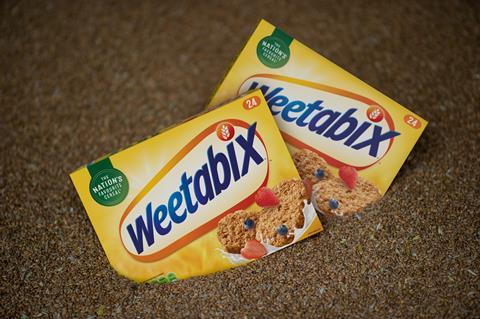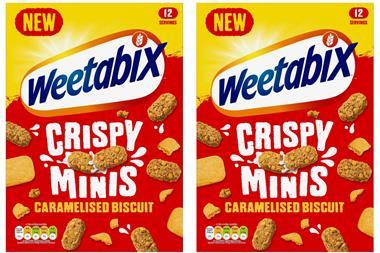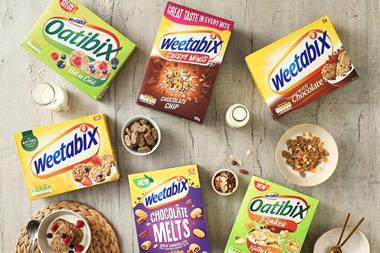
Weetabix has blamed another year of switching to private label cereals for falling volumes, as operating profit and revenue both shrank in 2024.
Volumes fell in all products aside from Weetabix’s signature plain biscuit, as shoppers sought out lower-priced own-label alternatives to its Alpen, Weetos and Ready Brek brands.
Weetabix’ operating profit fell 8.2% to £43.8m in the year to 30 September, its lowest level since 2021. Revenue was likewise down for the first time in four years, falling 2.1% to £361.1m, thanks in part to the discontinuation of its On The Go milkshakes alongside the drop in volumes.
However, an easing of utilities, raw materials and packaging input costs helped steady the company’s gross profit margin at 32%, up from 31.5% in 2023 – though still far below its prior five-year average margin of 39.2%.
Pre-tax profit was reduced from £51.8m to £50.6m.
A statement in the accounts made by finance director Bruce Condon on behalf of the board revealed structural pressures were likely to continue the downward trend in volumes.
“The economic outlook is improving with the prospect of interest rate cuts this year, but improvement in households’ prosperity is slow,” it read.
“Changes in shopping behaviour borne out of necessity over the last couple of years look to have become established behaviour. Whilst cereal remains a great value for money breakfast, we anticipate a continuation of the long-term gentle decline in volume year on year.”
Breakfast brands had a hard time at the till last year, with ready-to-eat cereal recording a 3% fall in volume [Kantar 52 w/e 29 September 2024]. Muesli fell 6.4%, and breakfast drinks – like Weetabix’s dropped On The Go brand – shrunk 14.3%.
Condon was confident in cereals’ staying power, noting that over half of all breakfasts feature cereal.
But a widening variation in breakfast diets towards “more modern” choices like yoghurt, pastries, fruit and premium coffee have meant cereal, toast and tea “losing out”.
He added that indulgent breakfasts, more typical of a weekend, were increasingly consumed in the week.
“In addition, a return to the normalcy of busy lifestyles, with longer commutes and more in-office working, is leading to an increase in breakfast eaten out of home.”
Weetabix’s own performance would remain steady, he said, despite these pressures: “The company expects to maintain acceptable profit performance and cash generation in the future, as it is a supplier of both strong equity brands and attractive value private label, with wide distribution channels.
“Additionally, with the continued implementation of HFSS restrictions in the supermarkets, and growing consumer concern about health and wellbeing, we anticipate those foods considered good for you and good value, will do well.”
Weetabix’s Deeside Cereals subsidiary, acquired in December 2023, likewise faced a “challenging” year. Turnover decreased pro rata 1.5% to £37.6m, largely due to its cutting of cereal bars from production.
Gross margin, however, improved 7.2 points to 37.2%, thanks in part to Weetabix settling of all its major interest-bearing liabilities and assets. It made an operating loss of £6.1m.
The own-label specialist produces malted wheats, special flakes, high fibre bran strands and multigrain flakes with fruit and nuts.
Weetabix employs around 1,020 workers, with 129 more staff at Deeside Cereals.



















No comments yet